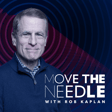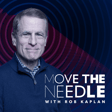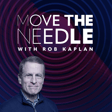
Todd Williams
This is Move The Needle with Rob Kaplan, where we talk to people who lead, innovate and inspire. Today on Move The Needle, Rob talks with Todd Williams, a man who made a lot of money on Wall Street, but also acted on his passion for public education.
Highly committed to public education, Todd is the founding Chairman and CEO of The Commit Partnership, the nation’s largest educational collective impact organization with over 200 institutions (including 15 school districts and eight higher-ed institutions educating over 790,000 students) supported by a dedicated backbone staff of ~60 employees. Together the Partnership and its backbone staff are collectively focused on improving post-secondary completion and economic mobility levels across the Dallas County region as well as the state of Texas. Todd also served for eight years as the Education Policy Advisor to former Dallas Mayor Mike Rawlings.
Todd is a senior trustee and former board chair for Austin College, a liberal arts college in Sherman, Texas. With his wife Abby, Todd was the founding chair for six years of the regional advisory board for Teach for America in Dallas/Ft. Worth, and together in 2007 they also helped establish the Uplift Williams Preparatory School, a K-12 free tuition public charter school operated by Uplift Education that educates over 1,500 primarily Hispanic children living in limited income homes in northwest Dallas.
Todd was appointed by Texas Governor Greg Abbott in 2020 to serve on (i) the Texas Permanent School Fund Corporation (responsible for overseeing the investment of the state’s ~$50 billion endowment fund supporting Texas’ K-12 public education system); (ii) the year-long 2018 Texas Commission on Public School Finance (where he chaired its Outcomes Committee which ultimately produced 35 recommendations that served as the basis for Texas’ landmark HB3 legislation which equitably invested $11.5 billion in the state’s public K-12 education system in 2019) and (iii) the 2021 Texas Commission on Community College Funding, which recommended the strategic investment of ~$650 million of new biennial state funding to reward targeted outcomes and increase accessibility for the state’s economically and academically disadvantaged students.
Todd is the former Chair of the Citizen Budget Review Commission for Dallas ISD ($1.7 billion budget educating ~155,000 students) and the former Vice-Chair of the Board of Trustees for Uplift Education, a public charter school management organization serving over 20,000 students across the D/FW area. He is also the former chairman of both the Real Estate Finance and Investment Center (located at the University of Texas) and the Real Estate Council of Dallas, the city’s largest real estate organization.
Prior to dedicating his efforts full time as a volunteer to public education, Todd served as a partner and global co-head of Goldman Sachs’ real estate private equity investment area, retiring in 2010 following a 20-year career with the firm in their New York, Los Angeles and Dallas offices. Total assets under management purchased by GS-managed real estate funds exceeded $100 billion in cost, including $10 billion of equity invested by Goldman Sachs and its managing partners.
Todd earned an M.B.A. with distinction from the Wharton School of Business at the University of Pennsylvania in 1989 and graduated with a B.A. in Economics from Austin College in Sherman, Texas in 1982.
#movetheneedlewithtoddwilliams #toddwilliams #texaseducation #thecommitpartnership #dallaseducation #austincollege #teachforamerica #upliftwilliamspreparatoryschool #gregabbott #texaspermanentschoolfundcorporation #privateequity #realestate #texascommissiononcommunitycollegefunding #goldmansachs #wharton #upenn #movetheneedlewithrobkaplan #samzeff #robkaplan #scottrichardson #ronelgolden


